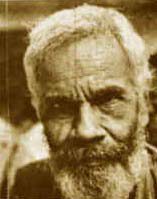 Tarauni, is not far away from Satlakha. He was brought up in his
native village. As per the tradition of those days, the child was admitted to a
Sanskrit pathshala (school). Thereafter, he studied Sanskrit at Kashi and
Calcutta and obtained the degree of ‘Sahitya Acharya’ in Sanskrit. But, Baba
never took up a job. He grew to become a restless traveler, a Sanskritist, classicist scholar, poet and religious rebel. He came under the
spell of the anti-colonial nationalism and joined the revolutionary peasant
movement led by Swami Sahajanand Saraswati. His first poem was published in
Maithili in 1930 under the pen-name ‘Yatri’. His association with Rahul Sankrtyayana led him to travels to Sri Lanka and conversion to Buddhism.
He became a communist at the same time and started writing in Hindi under the name 'Nagarjun'.
In fact, he was called Baba Nagarjun. From 1934 to 1941, Nagarjuna toured
various parts of India and even went abroad. He was very active in journalism
too during this period. Meanwhile, his first poem in Hindi was published in 1935
and he started writing under the name Nagarjun.Though always a well-known and popular poet,
initially he
was ignored by the conservative literary and critical establishment — till the great cultural upsurge in the Hindi-speaking areas in
late 1960’s and early 1970’s turned writers
like Nagarjun, Muktibodh, Shamsher Bahadur Singh and others
into cult figures.
His works include Baba Batesarnath, Balchanma, Ratinath ki Chachi,
Patrahin Nagna Gachh, Khichri Viplav Dekha Hamne, translations of Jayadeva’s
Gita Govinda, works of Kalidasa and many other classical works of Sanskrit
literature. His Pratinidhi
Kavitayen (a collection of representative poems, 1984) contains Hindi poems and Maithili poems. He was honoured with the Sahitya Akademi award (1968) for his
Patraheen Nagna Gaachh. He was honoured by the Sahitya Akademi, which
nominated him its Fellow in 1994. In addition to that he was honoured with the
Bharat Bharti award by the Uttar Pradesh Government, the Kabir Samman by the
Madhya Pradesh Government and the Rajender Shikhar Award by the Bihar
Government.
Tarauni, is not far away from Satlakha. He was brought up in his
native village. As per the tradition of those days, the child was admitted to a
Sanskrit pathshala (school). Thereafter, he studied Sanskrit at Kashi and
Calcutta and obtained the degree of ‘Sahitya Acharya’ in Sanskrit. But, Baba
never took up a job. He grew to become a restless traveler, a Sanskritist, classicist scholar, poet and religious rebel. He came under the
spell of the anti-colonial nationalism and joined the revolutionary peasant
movement led by Swami Sahajanand Saraswati. His first poem was published in
Maithili in 1930 under the pen-name ‘Yatri’. His association with Rahul Sankrtyayana led him to travels to Sri Lanka and conversion to Buddhism.
He became a communist at the same time and started writing in Hindi under the name 'Nagarjun'.
In fact, he was called Baba Nagarjun. From 1934 to 1941, Nagarjuna toured
various parts of India and even went abroad. He was very active in journalism
too during this period. Meanwhile, his first poem in Hindi was published in 1935
and he started writing under the name Nagarjun.Though always a well-known and popular poet,
initially he
was ignored by the conservative literary and critical establishment — till the great cultural upsurge in the Hindi-speaking areas in
late 1960’s and early 1970’s turned writers
like Nagarjun, Muktibodh, Shamsher Bahadur Singh and others
into cult figures.
His works include Baba Batesarnath, Balchanma, Ratinath ki Chachi,
Patrahin Nagna Gachh, Khichri Viplav Dekha Hamne, translations of Jayadeva’s
Gita Govinda, works of Kalidasa and many other classical works of Sanskrit
literature. His Pratinidhi
Kavitayen (a collection of representative poems, 1984) contains Hindi poems and Maithili poems. He was honoured with the Sahitya Akademi award (1968) for his
Patraheen Nagna Gaachh. He was honoured by the Sahitya Akademi, which
nominated him its Fellow in 1994. In addition to that he was honoured with the
Bharat Bharti award by the Uttar Pradesh Government, the Kabir Samman by the
Madhya Pradesh Government and the Rajender Shikhar Award by the Bihar
Government.Udaya Narayana Singh (b. 1951) --- Udaya Narayana Singh was born in Calcutta. He earned Linguistics honours at Sanskrit College, Calcutta, and later at the University of Delhi (Ph.D., 1979). He taught at several Indian Universities, including MSU - Baroda (1979-81), SGU - Surat (1981-85), University of Delhi (1985-87), and later at the University of Hyderabad (1987-2000). Currently, he is the Director of the Central Institute of Indian Languages, Mysore – the apex institution dealing with Indian languages. Dr Singh has been an Eshan Scholar of the University of Calcutta (1972), UGC Fellow (1994-99), a recipient of LSA fellowship at Urbana (1978), CIPL-grant for visiting Berlin (GDR) (1987), a member of the Indo-Italian Cultural Exchange Programme for Creative writers, and a member of the Official delegation of scholars to Trinidad & Tobago (2002). He has been Chief Editor of Indian Linguistics, 1988-1990, and a Visiting Professor of IIAS (1989). He writes in both Maithili (in which he has 3 collections of poems, 11 plays, and a few books in translation) with a pen-name ‘Nachiketa’ and also in Bengali (with two collections of poems, 3 books of translation, 7 edited books of essays and scores of literary essays). He has also translated from and into Bengali, Hindi, Gujarati, Maithili, Sanskrit and English, and has edited the first poetry journal in Maithili called Maithili Kavita for a number of years. His research publications in Linguistics and Translation Studies are over 150, and they are in varied fields.